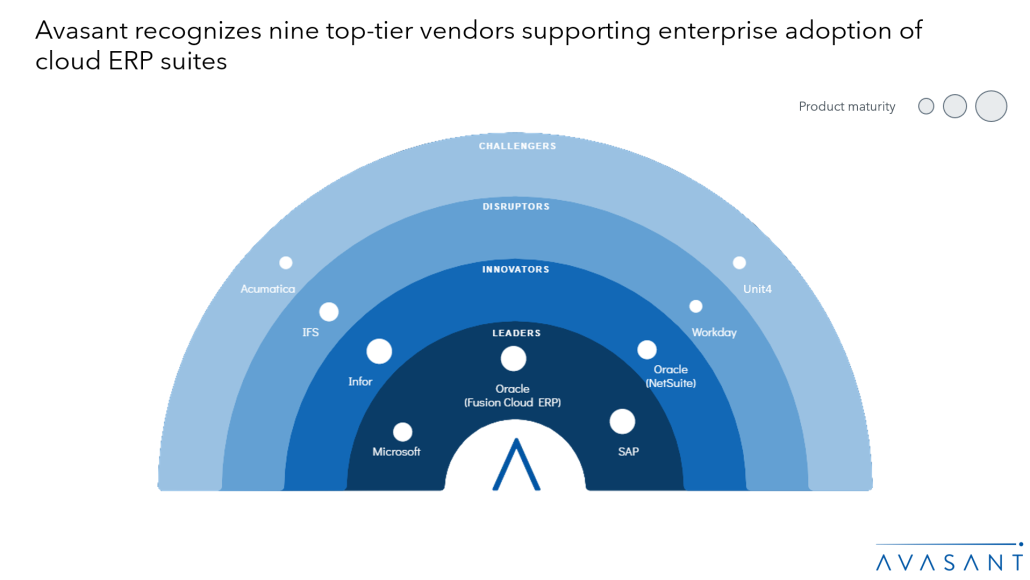Enterprises leverage cloud ERP systems to automate manual workflows, enhance financial reporting, optimize supply chains, and enable real-time data sharing across departments. By integrating generative AI, these systems deliver contextual insights through prescriptive financial forecasts, supply chain disruption alerts, and recommendations derived from both ERP modules and external data sources. Cloud ERP vendors are advancing automation with agentic AI solutions, enabling autonomous handling of customer queries, prioritization of sales leads, and resolution of transaction anomalies. Additionally, they are introducing ESG reporting capabilities for real-time emissions tracking, leveraging advanced analytics and integrated data from multiple entities.
Both demand-side and supply-side trends are covered in our Cloud ERP Suites 2024 Market Insights™ and Cloud ERP Suites 2024 RadarView™, respectively. These reports present a comprehensive study of ERP vendors and closely examine market leaders, innovators, disruptors, and challengers.
Avasant evaluated 16 vendors using three dimensions: product maturity, enterprise adaptability, and innovation road map. Of these, we recognized nine vendors who brought the most value to the market over the past 12 months.
The RadarView recognizes platform vendors in four categories:
-
- Leaders: Microsoft, Oracle (Fusion Cloud ERP), and SAP
- Innovators: Infor and Oracle (NetSuite)
- Disruptors: IFS and Workday
- Challengers: Acumatica and Unit4
The following figure from the full report illustrates these categories:

“The integration of generative AI within ERP platforms marks a shift from traditional rule-based systems to adaptive, intelligence-driven solutions,” said Ruth Steinberg, principal ERP consultant at Avasant. “This evolution supports real-time data access, enabling enterprises to improve operational agility and scale more effectively.”
The reports provide a number of findings, including the following:
-
- Cloud ERP adoption is rising, with over 80% of enterprises focusing on streamlining workflows, centralizing data to enhance financial decisions, standardizing data flows, and improving inventory management for scalable supply chain operations.
- Integrating generative AI into ERP platforms enhances operational efficiency and decision-making by enabling multivariate forecasting, accelerating content creation for product descriptions, automating the summarization of manufacturing anomalies, and diagnosing performance issues while recommending corrective actions.
- Manufacturing, retail, and professional services sectors, comprising 55% of ERP demand, leverage ERP for real-time monitoring, inventory control, and improved customer and project management, driving efficiency and service responsiveness.
- Sustainability-focused AI in ERP enables real-time tracking and reduction of carbon emissions, aligning enterprises with environmental targets. Centralized cloud ERP solutions improve resource efficiency and support sustainability goals through accurate emissions reporting.
“Generative AI in ERP is transforming how enterprises approach tasks such as demand forecasting and financial reporting,” said Premal Shah, lead analyst at Avasant. “By leveraging this technology, companies can automate financial narrative generation, enhance reporting accuracy, and achieve faster, data-driven outcomes across departments.”
The Cloud ERP Suites 2024 RadarView™ also features profiles of the nine ERP vendors, including their solutions, offerings, and experience in assisting enterprises with ERP adoption.
This Research Byte provides a brief overview of Avasant’s Cloud ERP Suites 2024 Market Insights™ and Cloud ERP Suites 2024 RadarView™. (Click for pricing.)


